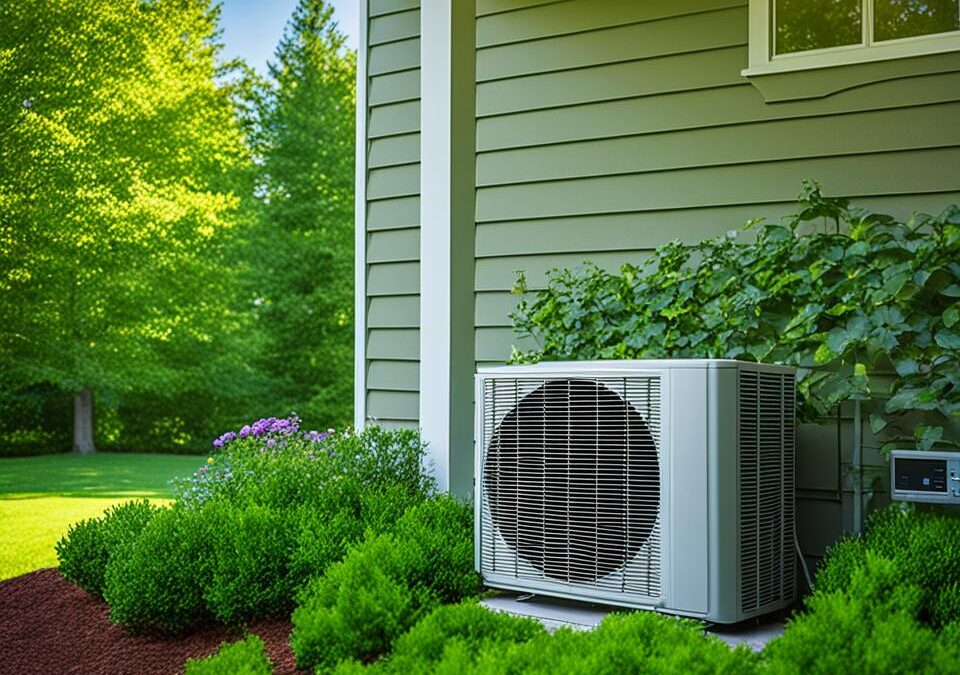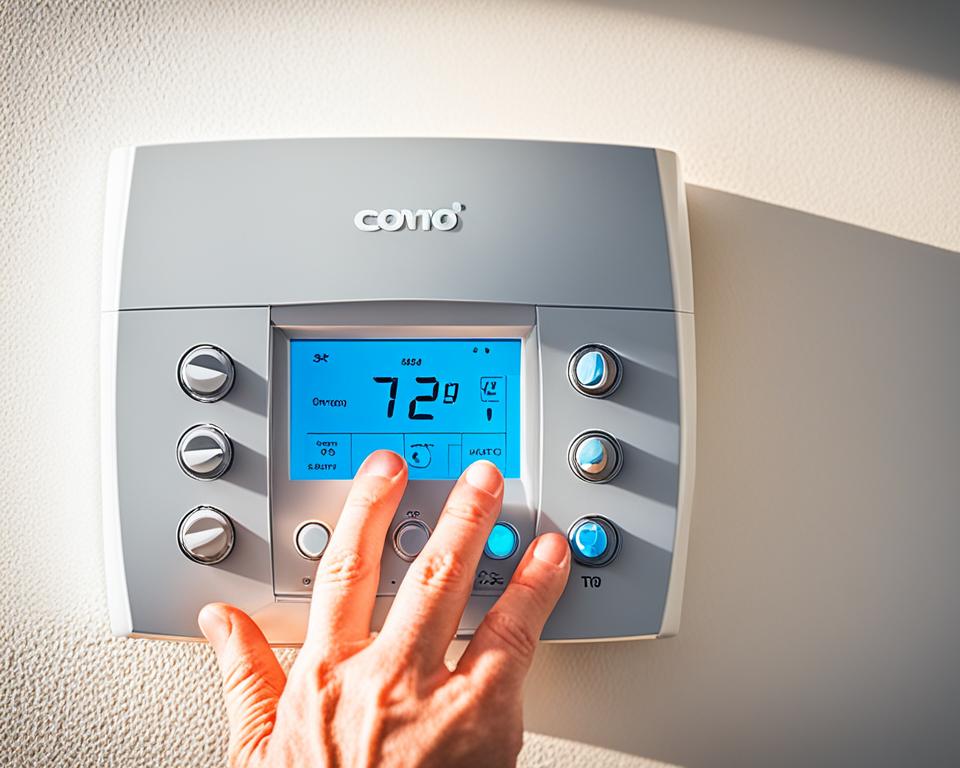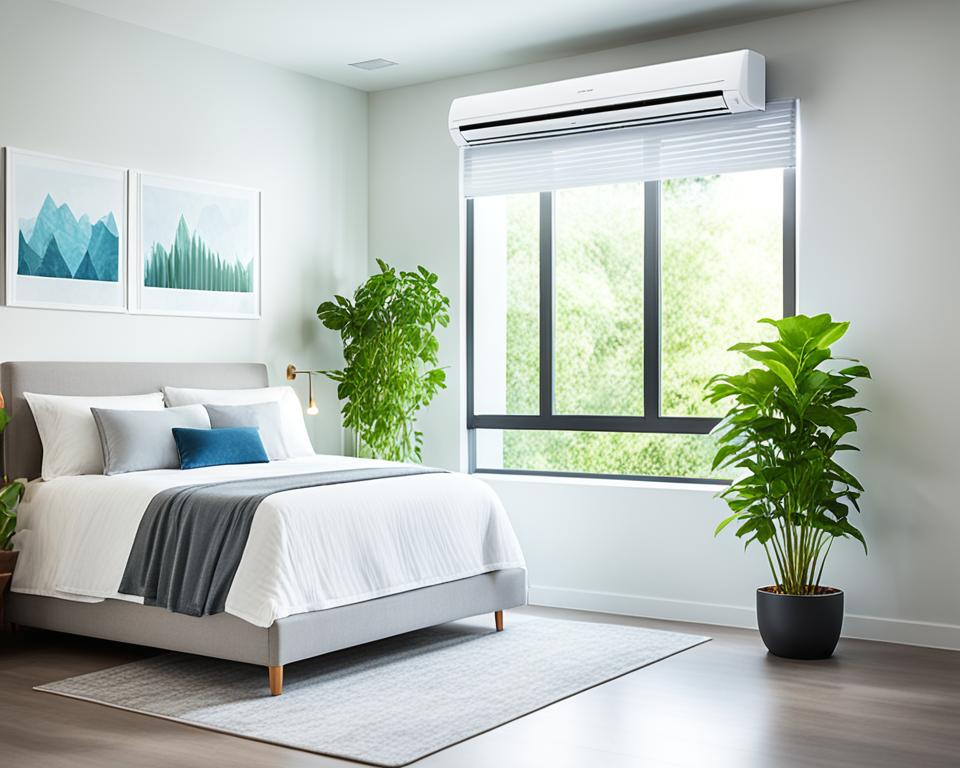Have you ever wondered how you can achieve eco-friendly cooling within your home without compromising comfort or spending a fortune?
This air conditioner energy efficiency guide resonates with homeowners seeking to maximize home comfort while minimizing cooling costs.
It aims to shed light on the intricate details of energy-cognizant decisions that not only enhance your home’s efficiency but also contribute positively to your budget and the environment.
Let’s delve into how making informed selections around energy consumption can unlock improved comfort, robust safety, elevated resale value, and water-tight durability for your home.
Tabe of Contents
- Understanding Air Conditioner Energy Efficiency
- Assessing Your Current Cooling System
- Air Conditioner Energy Efficiency: Key Components and Features
- Implementing Energy-Efficient Cooling Solutions at Home
- Financial Incentives and Rebates for Energy-Efficient Upgrades
- People Also Ask
- What does Air Conditioner Energy Efficiency mean for homeowners?
- What is the importance of Seasonal Energy Efficiency Ratio (SEER) Ratings?
- How can I evaluate my home’s cooling needs?
- What advancements have been made in high-efficiency air conditioner technology?
- How can I implement energy-efficient cooling solutions at home?
- What are the financial incentives and rebates available for energy-efficient upgrades?
- What are the long-term advantages of investing in energy-efficient HVAC systems?
- Conclusion
Key Takeaways
- Adopting an energy-efficient air conditioner can significantly reduce your cooling costs.
- Eco-friendly cooling doesn’t compromise home comfort; it enhances it.
- Lower energy consumption leads to a reduced carbon footprint.
- Energy-efficient homes boast higher resale values.
- Proactive, informed energy choices result in increased durability of home appliances.
Understanding Air Conditioner Energy Efficiency
Understanding the energy efficiency of air conditioners is critical for any homeowner looking for ways to reduce their energy bills and environmental impact.
The efficiency of an HVAC system, specifically the air conditioner, can significantly influence a home’s energy use. It determines how effectively your air conditioner can cool the home while consuming the least amount of power.
What Air Conditioner Energy Efficiency Means for Homeowners
Efficiency in context to air conditioning appliances means the capacity of the system to perform its intended function–cooling–to the highest degree possible while consuming minimal power.
A more efficient air conditioner unit implies less energy consumption for the same level of performance. This in turn, leads to lower utility bills, a smaller carbon footprint, and aligns with the goal of an energy-efficient home.
The Importance of Seasonal Energy Efficiency Ratio (SEER) Ratings
The efficiency of an air conditioner is commonly measured using the Seasonal Energy Efficiency Ratio (SEER) ratings. The SEER rating indicates the amount of cooling your system will deliver per each unit of energy consumed.
The higher the SEER rating, the more efficiently your air conditioning unit operates. This knowledge is paramount for homeowners to make informed decisions when investing in air conditioning units.
How Energy Efficient Air Conditioners Can Lower Utility Bills
Energy-efficient air conditioners operate at peak performance but consume less energy, leading to considerable savings on utility costs. A high energy-efficient HVAC unit correctly installed and sized for your home can reduce your total energy consumption by five to fifty percent annually, depending on the efficiency of the previous system.
This surpasses the returns from many traditional investments, making an efficient air conditioner an important part of your energy cost-saving strategies.
Efficiency improvements, including the adoption of a high-efficiency air conditioner can lead to significant utility cost savings and a smaller carbon footprint. Consequently, as homeowners become more conversant with SEER ratings, the importance of investing in energy-efficient cooling systems becomes evident.
The outcome is an improved comfort level at home, substantial cost savings, and a small contribution towards environmental conservation.
| System Efficiency | Annual Cooling Cost Savings |
|---|---|
| SEER 10 to 15 | $300 to $400 |
| SEER 15 to 20 | $400 to $500 |
| SEER 20+ | $500+ |
Assessing Your Current Cooling System
Before you can move towards more energy-efficient air conditioning, it’s crucial to first understand your current cooling system’s performance. This involves two key aspects: evaluating your home’s cooling needs and comparing the emissions of various energy sources.
Evaluating Your Home’s Cooling Needs
When it comes to assessing cooling systems, your specific home cooling needs play a central role. Factors such as your home’s size, insulation, and the local climate all impact how much cooling power you need during the hotter months. By understanding these factors, you can more accurately determine whether your existing air conditioner is sufficiently energy efficient.
Comparing Emissions of Various Energy Sources
Another key step in evaluating your AC’s efficiency involves comparing the emissions of different energy sources. For instance, one must consider the carbon dioxide emissions linked to using hydrocarbon fuels like coal, oil, or natural gas in power plants and home heating equipment.
With an energy efficient ac unit, homeowners can significantly reduce these emissions, thus making their cooling system more eco-friendly.
While hydroelectric plants themselves emit no carbon, the construction and maintenance of related structures do incur environmental costs. Renewable sources such as photovoltaics and wind are increasingly becoming popular as sustainable options.
Despite the advancements in renewable energy generation, conserving energy through efficient cooling systems remains one of the most effective ways of saving money on energy bills and reducing carbon footprint.
- Understand your home’s specific cooling needs
- Analyze the efficiency and emissions of your current cooling system
- Explore the emissions implications of your home’s broader energy mix
Assessing your cooling system, by evaluating your home cooling needs and comparing energy source emissions, allows you to identify opportunities for improving energy efficiency and environmental friendliness. This is the first, essential step towards adopting an energy efficient and eco-friendly air conditioner.
Air Conditioner Energy Efficiency: Key Components and Features
Modern air conditioners have paved the way for new trends in the realm of energy efficiency. In the endeavor to promote a greener planet, advancements in cooling technology have led to the development of key components in air conditioners.
These components achieve efficient cooling while consuming less energy. A few notable advancements include programmable thermostats and energy-efficient cooling solutions.
Advancements in High Efficiency Air Conditioner Technology
High-efficiency air conditioner technology has come a long way in improving performance while keeping energy consumption in check. Innovative designs have managed to combine effectiveness with sustainability, offering homeowners advanced solutions for their cooling needs.
The Role of Programmable Thermostats in Energy Saving
Programmable thermostats have emerged as a leading energy-saving innovation. These smart devices allow homeowners to schedule temperature settings throughout the day, reducing unnecessary energy usage and optimizing comfort levels. Present in most high-efficiency air conditioners, programmable thermostats offer a user-friendly approach to energy savings.
Importance of Regular Maintenance for Optimizing Efficiency
Regular HVAC maintenance plays a crucial role in ensuring optimal performance and the longevity of the system. By prioritizing maintenance, homeowners can prevent the system from malfunctioning, thus avoiding energy wastage. In addition, routine check-ups keep all the air conditioner energy efficiency components in top shape, leading to reliable and efficient cooling.
| Energy Efficiency Component | Role |
|---|---|
| Programmable Thermostats | Allow homeowners to schedule temperature settings and optimize energy usage |
| Regular HVAC Maintenance | Prevents systems from malfunctioning and optimizes system performance |
| Advancements in Cooling Technology | Improve performance while reducing energy consumption |
Implementing Energy-Efficient Cooling Solutions at Home
As our awareness rises towards the ramifications of our daily energy consumption, homeowners are seeking out practical ways to incorporate energy-efficient cooling into their homes.
This journey towards sustainable living may involve embracing eco-friendly air conditioners or implementing seemingly small changes that, when added up, create a significant impact on energy consumption. With an array of options available, let’s delve into the proactive steps homeowners can take to achieve this transition efficiently.
The Benefits of Eco-Friendly Air Conditioners
Eco-friendly air conditioners, often celebrated for their impressive SEER ratings, provide substantial energy savings while demonstrating a commitment to environmental sustainability. These air conditioners are specifically designed to maximize cooling efficiency, leading to significant reductions in running costs. Transitioning to these environmentally friendly options is a substantial step towards implementing energy-efficient cooling at home, deriving immense benefits in the process.
Small Changes for Big Impacts in Energy Consumption
Contrary to popular belief, drastic changes or a complete overhaul of the existing cooling system is not always necessary to reap the benefits of energy saving. Small, incremental changes to our everyday habits can result in significant energy savings too.
For instance, installing ceiling fans can significantly reduce the need for air conditioning, while using curtains to insulate rooms can prevent cool air from escaping, thereby ensuring that cooling systems operate proficiently.
Similarly, setting appropriate temperatures on thermostats contributes to energy saving. Regularly checking and sealing drafts is another small change that garners major savings. These intelligent practices not only enhance the energy efficiency in our homes but ensure that our cooling systems work less strenuously, all while maintaining ideal temperature settings.
In conclusion, the road towards energy-efficient cooling in our homes is paved with meaningful opportunities. From the adoption of eco-friendly air conditioners to rethinking our everyday habits, these changes collectively contribute to the broader goal of a more sustainable world. It’s time we make these small changes for a big impact, one cooling solution at a time.
Financial Incentives and Rebates for Energy-Efficient Upgrades
Eco-friendly improvements, such as high-efficiency HVAC systems, represent a significant stride towards a cleaner environment. Simultaneously, they offer extraordinary savings on energy costs for homeowners.
Often, apprehensions about upfront costs deter homeowners from pursuing these beneficial upgrades. However, many financial incentives and rebates aimed at promoting energy-efficient upgrades can alleviate these concerns, rendering them both feasible and enticing.
Understanding Federal and State Energy Efficiency Programs
Federal and state energy efficiency programs play a powerful role in democratizing access to sustainable renovations. Through initiatives like tax breaks and financial incentives, these programs effectively reduce homeowners’ renovation expenses, making energy-efficient upgrades more commercially palatable. Eligibility criteria and exact benefits may vary, but they significantly lower the barrier to entry for homeowners seeking to make eco-responsible choices.
Local jurisdictions frequently offer specific incentives tailored to the unique energy needs of their communities. These could range from reduced rates to rebates for purchasing energy-efficient appliances. Special financing for home energy improvements also forms part of these incentives, making it easier for homeowners to embrace energy-efficient adaptations.
| Energy Efficient Upgrades | Potential Incentives |
|---|---|
| High-efficiency HVAC systems | Rebates, Tax breaks |
| Energy-Efficient Appliances | Rebates, Reduced rates |
| Insulation | Special financing for home improvements |
By optimizing available resources, homeowners can not only benefit from lower energy costs but also contribute to the larger mission to reduce pollution and mitigate climate change. Therefore, comprehending and leveraging these opportunities serve as a foundation for a more sustainable mode of living.
People Also Ask
What does Air Conditioner Energy Efficiency mean for homeowners?
It means operating at maximum efficacy while consuming less power, leading to significant cost savings and a smaller carbon footprint. Energy-efficient air conditioners or HVAC systems can reduce homeowners’ utility bills between five to fifty percent annually.
What is the importance of Seasonal Energy Efficiency Ratio (SEER) Ratings?
SEER ratings measure an air conditioner’s energy efficiency. As a homeowner understands SEER ratings and their relevance to energy costs, they will see the value in investing in energy-efficient cooling systems, leading to improved comfort levels and environmental conservation.
How can I evaluate my home’s cooling needs?
You can evaluate your home’s cooling needs by analyzing energy consumption and comparing emissions from various energy sources. This process will help you understand your home’s carbon footprint and find ways to reduce it through efficient cooling systems.
What advancements have been made in high-efficiency air conditioner technology?
Modern high-efficiency air conditioner technologies feature programmable thermostats which offer significant energy savings by adjusting temperatures based on schedules, reducing the need for manual changes and optimizing energy consumption.
How can I implement energy-efficient cooling solutions at home?
Energy-efficient cooling solutions can come in the form of adopting eco-friendly air conditioners or making small yet impactful adjustments like installing ceiling fans, using curtains to insulate rooms, setting appropriate temperatures on thermostats, and optimizing ventilation and draught sealing.
What are the financial incentives and rebates available for energy-efficient upgrades?
Federal, state, and local jurisdictions offer various financial incentives and rebates for energy-efficient upgrades. These incentives include tax breaks, reduced rates, rebates for purchasing energy-efficient appliances, or special financing for home energy improvements.
What are the long-term advantages of investing in energy-efficient HVAC systems?
Long-term advantages include lower utility bills, increased property value, and enhanced home comfort. Sustainable approaches to home cooling also contribute to reducing reliance on energy sources that contribute to greenhouse gas emissions, hence supporting global efforts to tackle climate change.
Conclusion
As we explore our final discussion, we turn our attention towards the impactful and lasting benefits of investing in energy efficient systems. We delve into the long-term advantages opting for energy-efficient HVAC systems to build sustainable approaches towards home cooling. Combining the dual goals of comfort in our residences with mindful practices, we can contribute significantly to our planet’s well-being.
Choosing energy-efficient HVAC systems creates a ripple effect of benefits. From immediate cost savings to enhancing the equity of your home, these advantages span diverse facets of homeownership.
Beyond the tangible, investing in these systems aligns us with global efforts to combat climate change. As we face the reality of escalating energy prices, the financial rewards that accompany such energy-efficient improvements proliferate, vindicating the decision to invest in these eco-friendly measures.
Opting for energy-efficient HVAC benefits all homeowners, whether you’re partaking in minor home performance upgrades or embarking on significant renovations. This sustainable approach to home cooling is twofold: it not only confers tangible advantages such as lower utility bills and a more comfortable home but also actively lessens our individual carbon footprints.
This balance of personal convenience and global responsibility signals a promising future, where renewable energy consumption and a healthy environment coexist harmoniously for ultimate home comfort.

Bobby leads Air Conditioners Contractors with a vision for innovation and excellence in the HVAC industry. With a passion for customer satisfaction and a drive for technological advancement, he ensures the company remains at the forefront of delivering top-tier air conditioning solutions across the USA. His leadership fosters a culture of dedication, expertise, and commitment to exceeding client expectations.



